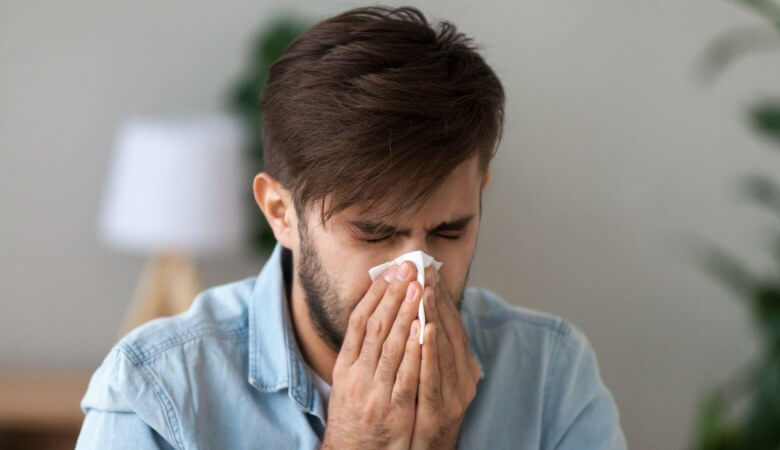Highlights
- Seasonal allergies can manifest as early as February, depending on weather and other factors.
- Seasonal allergies are well-understood medical conditions with effective treatments available both over the counter and by prescription.
- Getting the lowest price on your seasonal allergy medication can make mitigating symptoms easier.
Seasonal allergic rhinitis, commonly called hay fever or seasonal allergies, is a well-known misery, with one-quarter of all Americans experiencing at least some symptoms. Knowing which plants can cause allergic reactions and how to counter them can alleviate some of the discomfort and keep hay fever from derailing your life.
What Are Seasonal Allergies?
In seasonal allergies, when plants begin shedding their pollen into the air, humans inhale it. Proteins in the pollen can trigger a reaction from the immune system, sometimes within minutes of exposure. The tissues in the nose and face become inflamed and often remain so until pollen levels drop. While season allergic rhinitis is rarely dangerous, it is often uncomfortable and can interfere with daily activities.
When Is Allergy Season?
Allergy season can start as early as February in some regions. Most allergies are triggered by pollen, and different localities begin seeing rising pollen counts at different times. The exact time will depend on several factors:
- Temperature. As a rule of thumb, the milder the average winter, the earlier allergy season will start. Similarly, warm days will encourage more pollen production.
- Precipitation. Plants grow and pollinate at the whim of weather. Rainy springs and heavy snowmelt can encourage more plant growth, and expect higher pollen after a rainstorm.
- Wind. Plants often depend on wind to get their pollen where it needs to go, so pollen counts can soar on windy days.
- Location and variety of species. Depending on where you live, not all plant species may pollinate by wind. Places with relatively few of these species will have lower pollen counts.

Which Plants Cause Seasonal Allergies?
While some plants are infamous for causing allergies, there are several other suspects to be aware of.
- Ragweeds. Ragweeds are widely considered the most common source of allergic pollen in North America and are native to the U.S.
- Xanthiums. Also called cockleburs, these are also usually found in the Northern Hemisphere.
- Chenopodiums. Better known as pigweed, goosefoot, or lamb’s quarters, these plants are lesser known but very common allergy triggers.
- Artemisia. The genus that includes sagebrush and mugwort, these plants are more common in the Western U.S.
- Russian thistle. Russian thistle is also common in the Western U.S. and better known as tumbleweed.
Removing these plants from around your home may help reduce symptoms, although it’s likely impossible to remove every source of pollen from the surrounding area.
What Are Seasonal Allergy Symptoms?
If you’re not sure if it’s hay fever, check for the following symptoms:
- A runny or stuffy nose with clear mucus, as other causes of a runny nose will discolor mucus
- Sneezing, particularly sneezing fits
- Redness and itchiness of the eyes
- Swelling around the eyes
- Rings under the eyes
- Swollen nasal passages
- Fluid in the middle ear without signs of ear infection
Note that you don’t need all of the classic symptoms of hay fever to be diagnosed with seasonal allergies, although they tend to go hand in hand.

Which Medications Treat Seasonal Allergies?
Fortunately for allergy sufferers, there’s a fairly wide range of medications, both over the counter and prescription, that can help with symptoms. These medications are often paired with other remedies, such as indoor air filters and removing certain plants, for maximum effect. However, not all medications should be used in all situations. Familiarity with the different classes of allergy medication can help you pick the right tools for the job.
Antihistamines
Antihistamines are generally used for short-term relief from allergy symptoms. They aren’t a cure but can be highly effective. Antihistamines bond to receptors that allergens would normally latch on to, preventing them from triggering symptoms.
Commonly available antihistamines include:
- Loratadine (Claritin)
- Cetirizine (Zyrtec)
- Fexofenadine (Allegra)
Decongestants
Decongestants target runny noses and may not help if you have other allergy symptoms. Decongestants constrict blood vessels, helping to keep nasal passages open and drying up secretions. The most common decongestants — pseudoephedrine (Sudafed) and phenylephrine (Sudafed PE) — are available over the counter.
Decongestants are not recommended for people with high blood pressure, as the vasoconstriction may cause problems with their condition.
Nasal Corticosteroids
Seasonal allergies are essentially mild immune system disorders, and as with any immune disorder, corticosteroids can be used to limit inflammation. Nasal corticosteroids apply medication where they’re most needed; however, corticosteroids are generally only recommended for short-term use. Talk with your doctor about the possible concerns around long-term steroid use, particularly if you also use steroids to treat asthma.
The most commonly prescribed nasal corticosteroids include:
- Fluticasone (Flonase)
- Mometasone (Nasonex)
- Budesonide (Rhinocort)

Leukotriene modifiers
Also called antileukotrienes, leukotriene modifiers prevent inflammation by blocking proteins manufactured by the immune system that cause inflammation. Unlike other treatments, they can be taken regularly with fewer problems. However, if you have a history of mental illness, they may not be recommended as they can possibly induce mood changes or serve as a trigger.
Montelukast (Singulair) and zafirlukast (Accolate) are the most commonly prescribed drugs in this class.
Immunotherapy
With immunotherapy, the goal is to acclimate the immune system to allergens and reduce the reaction. This is done through gradual increasing exposure to allergens, either orally or intravenously as allergy shots. Immunotherapy should only be given under the supervision of a medical professional to limit possible risk from an extreme allergic reaction.
Get the Lowest Price on Seasonal Allergy Medication
No matter how you manage your seasonal allergies, you can get a better price on your medication with BidRX. You can put your prescription up for bid, and pharmacies from across the country will offer you their best price. Choose the one that best suits your needs, and you can have your medicine sent to your door or pick it up locally, depending on the offer you choose.
To get started, visit our medication page.
